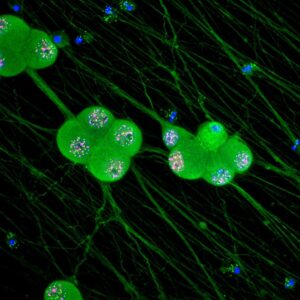Research
About

Herpes simplex virus latency in neurons. Neurons have memory of previous innate immune responses. Image courtesy of Anna Cliffe, PhD.
The breadth of our research is reflected in our name: Microbiology, Immunology, and Cancer Biology. Our themes are highly intersecting, leading to ongoing insightful and productive scientific collaborations throughout the Department. In addition to specific areas of bacteriology, virology, parasitology, immunology and cancer biology, examples of our cross-disciplinary research include:
- Basic mechanisms of cancer biology and infection
- Immune response to infection
- Cancer immunology
- Cell signaling in infection and autoimmunity
- Drug discovery across disciplines
- Vaccine development for cancer and infectious disease
Leadership
Our identity—and therefore our ability to collaborate—has been shaped by three extraordinary Chairs over the last 54 years. Bob Wagner (Chair 1967 – 1994) was a pioneer in vesicular stomatitis virus research and was founding editor-in-chief of the Journal of Virology, still the field’s preeminent publication. Tom Parsons, (Chair 1994 – 2010) discovered focal adhesion kinase (FAK), thus opening a new field of research. He, along with Mike Weber and Sally Parsons, took the basic science of viral oncogenes into the realm of cell signaling and cancer biology, which today is a Departmental cornerstone. Kodi Ravichandran (Chair 2010 – 2021) is widely known as a leader in the basic science of cell clearance, and whose research has influenced the study of immunology, homeostasis and disease. A fourth scientific leader, Bob Kadner, shaped our strength in bacteriology with his focus on bacterial transport systems, from his recruitment in 1969 until his death in 2005.
Numerous Centers, Institutes and Research Cores enable the cutting-edge research ongoing in the Department. NIH-sponsored Training Programs support thematic activities and the scientific development of our trainees.
